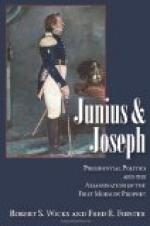On one of the warm days that fell at the end of the apple harvest, when such vagrant labourers as had collected to help the farmers were loitering at liberty, Smith held his first and last public meeting in the place where his boyhood had been passed. It was near the cross-roads on the old highroad to Palmyra, where a small wooden bridge carries over a creek that runs through the meadow to the Canandaigua. Here in the leisure time of the afternoon Smith lifted up his voice and preached to an ever-increasing crowd, composed first of men, and added to by whole families from most of those houses within touch of the village.
The elder Croom, his wife, and Susannah were returning from the weekly shopping at Palmyra’s store; they came upon the crowd, and stopped perforce. Wrath was upon the faces of the elder couple, and nothing less than terror upon Susannah’s white cheeks.
Susannah would have run far to have been saved the awful interrogation of opportunity. Perhaps all that she knew just then, in her childlike bewilderment, was that the slanders of the persecution were wrong, and her untrained mind jumped to the conclusion that the God of truth must therefore be with Smith. Beyond this there was unnamed wonder at the unexplained influence that Smith held over her, and more curious thoughts, stretching out like the delicate tendrils of an unsupported vine, concerning Halsey, his prayers and warnings, and the strength of selfless devotion that she had read in his innocent eyes.
Old Croom, deacon and magistrate, was not one to tarry at such a gathering longer than need be. When he perceived that some of the planks of the bridge had been taken to support the dam he alighted and broke down a log fence in order to drive his horses through meadow and stream to join the road nearer home. His women must needs walk over the scanty beams. Mrs. Croom, stately and well attired, could make her way through the crowd; no one there was so rapt but that he let her pass when, with eyes flashing in righteous indignation, she tapped him on the shoulder and bid him stand aside. Susannah followed in her aunt’s wake, the crowd of neighbours and strange labourers closing behind them again as they worked their way, of necessity slowly, nearer and nearer the preacher and the little band of adherents that stood steadfast around him.
Susannah heard the words of the sermon in which open confession of his own past sin, bold persuasions to Christianity and righteousness, were strangely mingled with the claim of the new prophet. She could not remember one moment what he had said the last. Low hisses and muttered threats of the angry men about her fell on her ears in the same way, making their own impression, but not on reason or memory. A sickening dread of a call that would come before she got away was all that she fully realised. It came when, in her white gala dress, she stood still at last near to, and under the eye of, the preacher.




